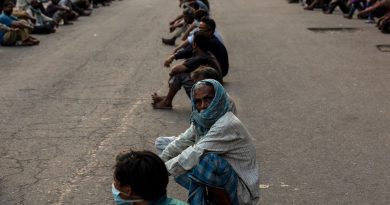OPINION: The story of Indian democracy written in blood and betrayal
by Pratap Bhanu Mehta
The BJP thinks it is going to Indianise Kashmir. But, instead, what we will see is potentially the Kashmirisation of India.
There are times in the history of a republic when it reduces itself to jackboot. Nothing more and nothing less. We are witnessing that moment in Kashmir. But this moment is also a dry run for the political desecration that may follow in the rest of India. The manner in which the BJP government has changed the status of Jammu and Kashmir by rendering Article 370 ineffective and bifurcating the state is revealing its true character. This is a state for whom the only currency that matters is raw power. This is a state that recognises no constraints of law, liberty and morality. This is a state that will make a mockery of democracy and deliberation. This is a state whose psychological principle is fear. This is a state that will make ordinary citizens cannon fodder for its warped nationalist pretensions.
The narrative supporting a radical move on Kashmir is familiar. Article 35(a) was a discriminatory provision and had to go. Article 370 was not a mechanism for integration but a legal tool for separatism. The Indian state, despite the horrendous violence it has used in the past, has never had the guts to take a strong stand on Kashmir. The radicalisation within Kashmir warrants a crackdown. The treatment meted to Kashmiri Pandits has never been recompensed either through justice or retribution. The international climate is propitious. We can do what China is doing: Remake whole cultures, societies. We can take advantage of the fact that human rights is not even a hypocrisy left in the international system. We can show Pakistan and Taliban their place. Let us do away with our old pusillanimity. Now is the time to seize the moment. Settle this once and for all, if necessary with brute force.
There are kernels of truth to many of these arguments. The status quo was a double whammy: It did nothing to address the well-being of Kashmiris who have now endured two generations of what was effectively military occupation. And it increased the gulf between Kashmir and the rest of the nation. So some movement was inevitable. But the kernel of truth is being deployed with an armoury of evil. The solution being proposed is an annihilation of decency. The fact that these measures had to be done under stealth, with a tight security noose and informational blackout is a measure of the evil of the step taken. This is not the dawn of a new constitutional settlement, designed to elicit free allegiance. It is repression, plain and simple, reminiscent of the Reichstag or Chinese constitutional ideology that sees federalism as an obstacle to a strong state and homogenous culture.
Think of the proposal’s broader ramifications. India has betrayed its own constitutional promises. India has many asymmetric federalism arrangements outside of Kashmir. This act potentially sets the precedent for invalidating all of them. How can we justify offering Nagaland asymmetric federalism but deny it to Kashmir? Its implication is that the government can unilaterally declare any existing state to be a Union Territory. This is a constitutional first. We are simply a union of Union Territories that happen to be a state at the discretion of the Centre.
Let us also not put too fine a point on this. Even if Article 370 were to be scrapped, the proposal to alter Jammu and Kashmir’s status to Union Territory, even if temporarily, is designed to humiliate an already subjugated population. How dare a Muslim dominated state exist in India? Kashmir can now not even be trusted to be a state. The optics of this measure is not integration, it is humiliation, of a piece with subtle and unsubtle reminders to minorities of their place in India.
Let’s take the argument that this pain is worth the price, if it actually solves the problem. But will it? There will be a sullen peace, militarily secured, that we will mistake for victory. The very army, behind whom every patriot now hides, will now potentially be put in even more harm’s way: To be used more and more as the sole basis for keeping India together. And even if we concede to the tragic necessity of force, that force can work only in the context of a larger political and institutional framework that inspires free allegiance, not fear. But even if Kashmir resigns to its fate, pummelled by military might, the prospect of radicalisation in the rest of the country cannot be ruled out. There are already incipient signs of that. The theatre of political violence will shift. In the context of the communally sensitive arc from UP to Bengal and in Kerala, India will seem more fragile.
For, fundamentally, what this change signals is that Indian democracy is failing. It is descending into majoritarianism, the brute power of the vote; it will no longer have the safety valves that allowed inclusion. The feckless abdication of the Opposition will only deepen the sense of alienation. There are no political avenues for protest left. Most of the so-called federal parties turned out to be more cowardly than anyone anticipated; the Congress can never stand for any convictions. Not a single one of us can take any constitutional protections for granted. Parliament is a notice board, not a debating forum.
Let us see what the Supreme Court does, but if its recent track record is anything to go by, it will be more executive minded than the executive. Kashmir is not just about Kashmir: In the context of the UAPA, NRC, communalisation, Ayodhya, it is one more node in a pattern hurtling the Indian state towards a denouement where all of us feel unsafe. Not just Kashmiris, not just minorities, but anyone standing up for constitutional liberty.
The larger worry is the fabric of our culture that is making this possible. There is a propaganda machinery unleashed with the media that builds up a crescendo baying for blood and calls it nationalism. There is the coarsening of human sentiments that makes empathy look worse than violence. There is the sheer political impatience with any alternative. The old Congress system of dealing with these issues appears so decrepit and corrupt that even a total carpet bombing of institutions and morality will be better. There is a kind of cruel aestheticism in our politics where audacious evil will be celebrated for its audacity, and mundane goods will invite contempt because they are mundane.
These proposals are not about solving a problem. What is playing out in Kashmir is the warped psyche of a great civilisation at its insecure worst. The BJP thinks it is going to Indianise Kashmir. But, instead, what we will see is potentially the Kashmirisation of India: The story of Indian democracy written in blood and betrayal.
Article first published on Indian Express.
Pratap Bhanu Mehta is Contributing Editor at the Indian Express. He has been vice-chancellor of Ashoka University and president, Centre Policy Research, New Delhi, one of India’s top think tanks.
Disclaimer: Views expressed by writers in this section are their own and do not reflect Milli Chronicle’s point-of-view.



